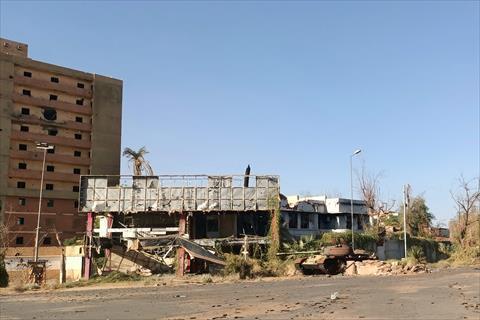
In a significant development that marks a crucial turning point in Sudan’s ongoing internal conflict, the chief of the paramilitary group, the Rapid Support Forces (RSF), has admitted to a strategic withdrawal from the nation’s capital, Khartoum. This move, which comes after weeks of intense fighting between the RSF and the Sudanese military, has drawn international attention and raised alarms about the future of Sudan’s political stability.
Sudan has been grappling with a complex political crisis for years. The country underwent a revolution in 2019 that ousted long-time dictator Omar al-Bashir, leading to a fragile transition to civilian rule. However, the process has been marred by political infighting, economic collapse, and widespread discontent. In October 2021, a military coup d’état led by General Abdel Fattah al-Burhan, the head of Sudan’s armed forces, derailed hopes for a peaceful democratic transition.
In April 2023, tensions between Burhan and Mohamed Hamdan Dagalo, the leader of the RSF, escalated into open conflict. The RSF, originally formed as a militia to counter insurgencies in Darfur, had become a powerful and influential force. As tensions rose, both sides fought for control of key government institutions, military bases, and the capital itself, leading to widespread violence and destruction in Khartoum.
Mohamed Hamdan Dagalo, better known as Hemedti, publicly acknowledged that the RSF had pulled back from Khartoum. The decision was framed as a tactical retreat, aimed at regrouping and preparing for further confrontations. He stated that the RSF would focus its efforts on securing other strategic areas in Sudan, where it maintains significant influence.
This announcement came after months of heavy combat that had devastated much of Khartoum, resulting in thousands of casualties and displacing many more civilians. The withdrawal is seen by some analysts as a reflection of the RSF’s diminished capacity to hold the capital, while others view it as a calculated move to avoid further direct confrontation with the Sudanese military, which still retains control over key military assets.
The withdrawal of the RSF from Khartoum has several profound implications, both for Sudan’s internal dynamics and for the broader region.
The Reshaping of Military Power: With the RSF pulling back from the capital, General al-Burhan’s Sudanese Armed Forces (SAF) remain the dominant military power in Khartoum and other urban areas. However, the RSF’s strategic retreat does not necessarily mean the end of the conflict. The RSF retains control over several regions in Sudan, particularly in the Darfur region and parts of the Red Sea coast. Their presence in these areas could allow them to launch counteroffensives or continue to pressure the central government.
Civilians in the Crossfire: As the conflict drags on, it is the Sudanese civilians who are bearing the brunt of the violence. Khartoum’s infrastructure has been severely damaged, and millions of people are living in dire conditions, with limited access to food, water, healthcare, and basic necessities. The fighting between the SAF and RSF has led to widespread displacement, with many fleeing to neighboring countries such as Egypt and Chad.
Regional Instability: The situation in Sudan has the potential to destabilize the wider region. Neighboring countries like South Sudan, Ethiopia, and Egypt are all affected by the conflict in different ways, whether through refugee flows, security threats, or economic disruptions. Furthermore, Sudan’s role in regional politics, particularly in the Horn of Africa, has been compromised, affecting diplomatic and trade relations.
International Reaction: The international community has been deeply concerned about the ongoing conflict and its humanitarian consequences. The United Nations, the African Union, and other international bodies have called for an immediate ceasefire and an end to hostilities. However, despite these calls, the fighting has continued with little regard for diplomatic pressure. The United States, the European Union, and other Western countries have imposed sanctions on both the SAF and RSF, but these measures have yet to yield a resolution to the conflict.
A Potential Stalemate: While the withdrawal of the RSF from Khartoum may reduce the intensity of the fighting in the capital, it is unlikely to bring an immediate end to the conflict. The situation in Sudan is now characterized by a complex stalemate, with no clear victor emerging from the ongoing violence. Both the SAF and RSF are entrenched in their positions, and unless a negotiated settlement can be brokered, Sudan could face prolonged instability.
For Sudan to emerge from its current crisis, a comprehensive peace agreement must be reached. This will require dialogue between the Sudanese military, the RSF, and other key political factions. International actors will also need to play a constructive role in facilitating these discussions, offering incentives for peace, and ensuring that all parties adhere to a ceasefire.
However, the path to peace remains fraught with challenges. Both the SAF and the RSF have deep-rooted interests in maintaining power and influence, and neither side is likely to agree to a settlement that undermines their position. Moreover, Sudan’s civilian population, who have long been excluded from meaningful political processes, will need to be included in any post-conflict governance framework to ensure that a lasting peace is achieved.
The withdrawal of the RSF from Khartoum is a significant development in Sudan’s ongoing conflict, but it does not signal the end of the violence or the resolution of the country’s political crisis. While the RSF may have retreated strategically, the underlying issues driving the conflict remain unresolved. As Sudan continues to navigate this turbulent period, it will require the concerted efforts of both domestic actors and the international community to chart a path toward peace, stability, and a genuine democratic transition.

